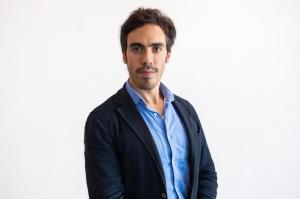
Arifa Raj and Marc Castro Interviewed by Fotis Georgiadis
Arifa Raj, Director of Marketing at Exidio. Marc Castro, founder of Datalyse.
GREENWICH, CT, USA, April 7, 2022 /EINPresswire.com/ -- Fotis Georgiadis, owner of the blog by his namesake, is a branding and image consultant specialist with a robust background and is a visionary interviewer. With a knack for pulling out a well-rounded interview, not only covering cutting edge technologies and corporate directions but also bringing out the personal side of the interviewee.
Blockchain, a word that a few years ago no one had heard about, but through word of mouth and marketing, is known the world over, even if people don't understand what it is, they still recognize the word. Imagine your business, your product, having that kind of recognition? Fotis Georgiadis can help build that trust, that exposure for your brand, your image.
-
Arifa Raj, Director of Marketing at Exidio
What are the 3 things that most excite you about blockchain and crypto? Why?
1. Growth potential. There is a use case available in blockchain for nearly every product or service, the tech eliminates borders, and the market keeps growing in terms of investments, adoption, and introduction of new use cases. The global cryptocurrency market cap is $2.05T with 14,000 cryptocurrencies and 430 exchanges. The global equity trading volume is 37.7 trillion while that of crypto is 1.8 trillion.
2. Use cases. Blockchain is powering new models of change, advancing knowledge, and helping social organizations create shared systems of record that respond to corporate donors’ requirements. The technology ensures assets and impact on the environment can be tracked, audited and communicated. For example, product traceability, where you know the coffee you are drinking is sourced in a responsible and sustainable way. Imagine solving one of the world’s deadliest problems: plastic pollution with blockchain technology.
3. Governments turning to blockchains for transparency. Blockchain voting, judiciary, law and order, land and registration. Again, it brings the possibility of imagining a world with reduced corruption as we progress into the 21st century.
What are the 3 things that worry you about blockchain and crypto? Why?
1. Hacking. Blockchains were once hailed as unhackable, but more and more security holes are appearing every now and then. In 2020 alone, $3.8 billion were stolen in hacker attacks.
2. Lack of adoption. Track and trace capability is an amazing use case, but it also requires the suppliers to adopt the technology, and it is limited to the larger organizations which are still struggling for wider adoption, let alone the smaller ones which have to struggle with cost.
3.Skills gap. Even after 13 years, blockchain is still considered an emerging technology and the skills needed to develop and use it are in short supply. The marketplace for blockchain skills is highly competitive and demand for engineers is surging by more than 500% year over year. Despite the growth and progress, mass adoption of blockchain is still far away given the huge potential.
-
Marc Castro, founder of Datalyse
What are your “5 Things I Wish Someone Told Me When I First Started Leading My Company” and why? (Please share a story or example for each.)
Don’t try to tackle 3 products at once.
Start with a sub-niche not try to be everything for everyone.
Get yourself a mentor that is 3 steps ahead and one that is 10 steps ahead.
Don’t follow superficial metrics, be factual, realistic even if it hurts is the only way.
Get a support network when things get hard because they will get hard.
Let’s imagine that a reader reading this interview has an idea for a product that they would like to invent. What are the first few steps that you would recommend that they take?
Have an audience or talk to 10 customers that have current issues.
Assess your skills and see if you can collaborate with someone that can complement your skills to execute the idea.
Create an MVP with barebones that solves one pain point that creates value to the customer.
Customer feedback is paramount and do any iterations needed.
Find a way to make it repeatable and scalable with clear outcomes and tangible value to the customer.
There are many invention development consultants. Would you recommend that a person with a new idea hire such a consultant, or should they try to strike out on their own?
No, unless you are partnering and collaborating to develop that idea. It can become very capital intensive and they would not have the same purpose as you. Yet, it can be a great idea once you have developed a product that you have gotten traction and are in need of improvement.
What are your thoughts about bootstrapping vs looking for venture capital? What is the best way to decide if you should do either one?
Bootstrapping must be the first option unless it is a product that requires intensive capital to start research and development for the product in aerospace, science, or manufacturing. Even then you must have clear evidence and demand for that product. Bootstrapping means that you must be able to get traction, get some clients, and have results, capital is for when you need to jump spring to the next level and speed up. Otherwise, you will be stressing about money, obtaining more money whilst you are jumping off a cliff whilst building your business, and focusing on superficial metrics. Don’t make it harder for yourself.
The full interview is available here
You can reach out to Fotis Georgiadis at the below-listed website, email and social media links to discuss how he can help your brand and image.
About Fotis Georgiadis
Fotis Georgiadis is the founder of DigitalDayLab. Fotis Georgiadis is a serial entrepreneur with offices in both Malibu and New York City. He has expertise in marketing, branding and mergers & acquisitions. Fotis Georgiadis is also an accomplished VC who has successfully concluded five exits. Fotis Georgiadis is also a contributor to Authority Magazine, Thrive Global & several others.
Contact and information on how to follow Fotis Georgiadis' latest interviews:
Website: http://www.fotisgeorgiadis.com
Email: fg@fotisgeorgiadis.com
LinkedIn: https://www.linkedin.com/in/fotis-georgiadis-994833103/
Twitter: https://twitter.com/FotisGeorgiadi3 @FotisGeorgiadi3
Fotis Georgiadis
fotisgeorgiadis.com
+1 203-983-1234
email us here
Visit us on social media:
Twitter
LinkedIn
Distribution channels: Business & Economy, Companies, Media, Advertising & PR, Social Media, Technology
Legal Disclaimer:
EIN Presswire provides this news content "as is" without warranty of any kind. We do not accept any responsibility or liability for the accuracy, content, images, videos, licenses, completeness, legality, or reliability of the information contained in this article. If you have any complaints or copyright issues related to this article, kindly contact the author above.
Submit your press release

